114 books about Liberty and 6
start with E
114 books about Liberty and 6
114 books about Liberty
6 start with E start with E
6 start with E start with E

Education and Liberty
The Role of the Schools in a Modern Democracy
James Bryant Conant
Harvard University Press
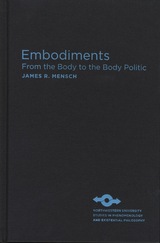
Embodiments
From the Body to the Body Politic
James R. Mensch
Northwestern University Press, 2009
How does the body politic reflect the nature of human embodiment? To pursue this question in a new and productive way, James Mensch employs a methodology consistent with the fact of our embodiment; he uses Merleau-Ponty’s concept of "intertwining"—the presence of one’s self in the world and of the world in one’s self—to understand the ideas that define political life.
Mensch begins his inquiry by developing a philosophical anthropology based on this concept. He then applies the results of his investigation to the relations of power, authority, freedom, and sovereignty in public life. This involves confronting a line of interpretation, stretching from Hobbes to Agamben, which sees violence as both initiating and preserving the social contract. To contest this interpretation, Mensch argues against its presupposition, which is to equate freedom with sovereignty over others. He does so by understanding political freedom in terms of embodiment—in particular, in terms of the finitude and interdependence that our embodiment entails. Freedom, conceived in these terms, is understood as the gift of others. As a function of our dependence on others, it cannot exist apart from them. To show how public space and civil society presuppose this interdependence is the singular accomplishment of Embodiments. It accomplishes a phenomenological grounding for a new type of political philosophy.
Mensch begins his inquiry by developing a philosophical anthropology based on this concept. He then applies the results of his investigation to the relations of power, authority, freedom, and sovereignty in public life. This involves confronting a line of interpretation, stretching from Hobbes to Agamben, which sees violence as both initiating and preserving the social contract. To contest this interpretation, Mensch argues against its presupposition, which is to equate freedom with sovereignty over others. He does so by understanding political freedom in terms of embodiment—in particular, in terms of the finitude and interdependence that our embodiment entails. Freedom, conceived in these terms, is understood as the gift of others. As a function of our dependence on others, it cannot exist apart from them. To show how public space and civil society presuppose this interdependence is the singular accomplishment of Embodiments. It accomplishes a phenomenological grounding for a new type of political philosophy.
[more]
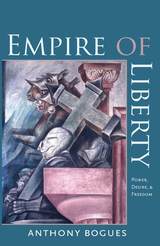
Empire of Liberty
Power, Desire, and Freedom
Anthony Bogues
Dartmouth College Press, 2010
In this thoughtful and timely consideration of the nature of American power and empire, Anthony Bogues argues that America’s self-presentation as the bastion of liberty is an attempt to force upon the world a single universal truth, which has the objective of eradicating the radical imagination. Central to this project of American supremacy is the elaboration and construction of a language of power in which a form of self-government appears as the form of sovereignty. Grappling with issues of power, race, slavery, violence, and the nature of postcolonial criticism and critical theory, Bogues offers reconsiderations of the writings of W. E. B. DuBois and Frantz Fanon in order to break holes in this accepted structure of empire. At its heart this is a work of radical humanistic theory that seeks to glean from the postcolonial world and empire an alternative to its imperial form of freedom.
[more]
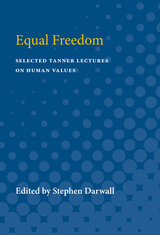
Equal Freedom
Stephen Darwall, Editor
University of Michigan Press, 1995
and libertarian are frequently seen as opposing political labels. These two views and their oppositions are the topic of this collection of important essays by an exceptionally distinguished group of thinkers. Each was originally given as one of the lectures in the Tanner Lectures on Human Values series. This collection of essays can be read as a critique of libertarianism. A libertarian, in contemporary discussion, is one who supports no more than a minimal state—a government that protects individuals from assault, murder, theft, and other invasions of their "Lockean" rights but otherwise does not interfere with voluntary economic or personal activity. Egalitarian, on the other hand, generally refers to someone who is prepared to favor such interference if it is necessary to reduce substantial inequalities of certain kinds and if, perhaps, it is democratically authorized. Several of the essays, those of John Rawls, T. M. Scanlon, G. A. Cohen, and Ronald Dworkin, advance different versions of this liberal egalitarian line of argument. Each maintains that the ideas of freedom and equality are part of a fundamental justificatory ideal from which any rights-specifying norms, including those of libertarianism, would have to be derived. Each proposes a distinctive vision of this fundamental ideal. And each argues, on this basis, for egalitarian moral or political principles. Amartya Sen's essay can also be placed within a broadly liberal egalitarian tradition, although it is less an argument for substantive equality (and against libertarianism) than a discussion of what form a reasonable egalitarianism might take. Quentin Skinner directly criticizes libertarianism in ways that arguably tend to support egalitarianism, although this is not his primary aim.
[more]
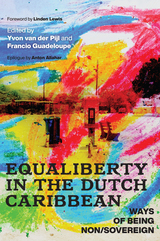
Equaliberty in the Dutch Caribbean
Ways of Being Non/Sovereign
Yvon van der Pijl
Rutgers University Press, 2022
Equaliberty in the Dutch Caribbean is a collection of essays that explores fundamental questions of equality and freedom on the non-sovereign islands of the Dutch Caribbean. Drawing on in-depth ethnographic research, historical and media analysis, the study of popular culture, and autoethnographic accounts, the various contributions challenge conventional assumptions about political non/sovereignty. While the book recognizes the existence of nationalist independence movements, it opens a critical space to look at other forms of political articulation, autonomy, liberty, and a good life. Focusing on all six different islands and through a multitude of voices and stories, the volume engages with the everyday projects, ordinary imaginaries, and dreams of equaliberty alongside the work of independistas and traditional social movements aiming for more or full self-determination. As such, it offers a rich and powerful telling of the various ways of being in and belonging to our contemporary postcolonial world.
[more]
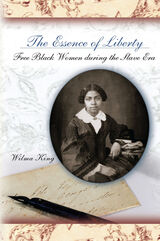
The Essence of Liberty
Free Black Women During the Slave Era
Wilma King
University of Missouri Press, 2006
Before 1865, slavery and freedom coexisted tenuously in America in an environment that made it possible not only for enslaved women to become free but also for emancipated women to suddenly lose their independence. Wilma King now examines a wide-ranging body of literature to show that, even in the face of economic deprivation and draconian legislation, many free black women were able to maintain some form of autonomy and lead meaningful lives.
The Essence of Liberty blends social, political, and economic history to analyze black women’s experience in both the North and the South, from the colonial period through emancipation. Focusing on class and familial relationships, King examines the myriad sources of freedom for black women to show the many factors that, along with time spent in slavery before emancipation, shaped the meaning of freedom. Her book also raises questions about whether free women were bound to or liberated from gender conventions of their day.
Drawing on a wealth of untapped primary sources—not only legal documents and newspapers but also the diaries, letters, and autobiographical writings of free women—King opens a new window on the world of black women. She examines how they became free, educated themselves, found jobs, maintained self-esteem, and developed social consciousness—even participating in the abolitionist movement. She considers the stance of southern free women toward their enslaved contemporaries and the interactions between previously free and newly freed women after slavery ended. She also looks closely at women’s spirituality, disclosing the dilemma some women faced when they took a stand against men—even black men—in order to follow their spiritual callings.
Throughout this engaging history, King underscores the pernicious constraints that racism placed on the lives of free blacks in spite of the fact that they were not enslaved. The Essence of Liberty shows the importance of studying these women on their own terms, revealing that the essence of freedom is more complex than the mere absence of shackles.
[more]
READERS
Browse our collection.
PUBLISHERS
See BiblioVault's publisher services.
STUDENT SERVICES
Files for college accessibility offices.
UChicago Accessibility Resources
home | accessibility | search | about | contact us
BiblioVault ® 2001 - 2024
The University of Chicago Press









